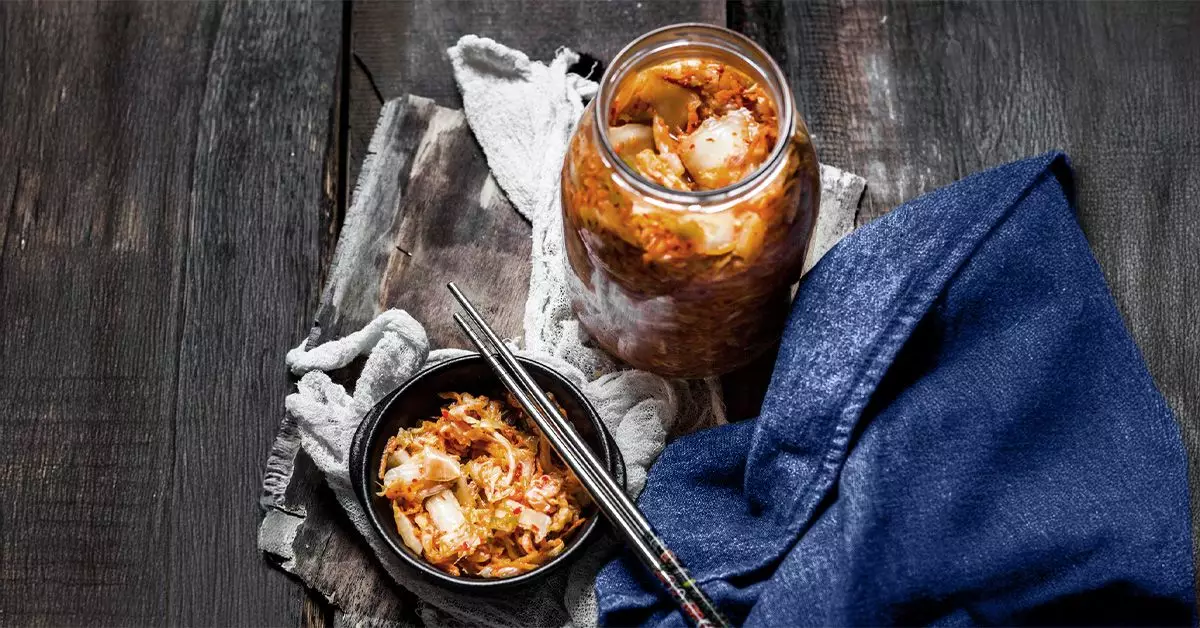Kimchi, a beloved staple of Korean cuisine, embodies the rich culinary traditions and vibrancy of Korean culture. This fermented dish, primarily consisting of vegetables such as napa cabbage and radishes, is celebrated not only for its distinctive, tangy flavor but also for its purported health benefits attributed to its probiotic content. In many households, particularly among Koreans and other East Asian populations, kimchi is more than just a side dish; it is a daily ritual. The process of making kimchi, which involves salting the vegetables and introducing a medley of spices—like garlic, ginger, and chili powder—allows for a fermentation process that not only enhances its taste but is also believed to promote gut health.
Despite its revered status, however, recent discussions surrounding the health implications of consuming kimchi have raised eyebrows. While many remain steadfast advocates of its benefits, an undercurrent of concern has emerged regarding its potential link to gastric health issues, sparking a critical examination of its implications for those who consume it regularly.
Link Between Kimchi and Gastric Cancer: A Complex Puzzle
The potential association between kimchi consumption and the risk of stomach cancer is a multifaceted issue. Some studies have managed to draw correlations between high intake levels of pickled vegetables and an increased risk of gastric malignancies. For instance, a meta-analysis published in 2020 highlighted a staggering 15% increase in gastric cancer risk with just a 40-gram daily rise in pickled vegetable consumption. This data could suggest a dietary link, but attributing the risk solely to kimchi itself would be an oversimplification.
Critics argue that the sodium content in kimchi—a fundamental element of its preservation—could be a contributing factor to this observed association. In several cultures, including Korean, high salt intake is already identified as a risk factor for gastric cancer. However, this theory does not tell the whole story, as bodily responses to high sodium consumption can vary widely among individuals, influenced by genetics, overall diet, and existing health conditions.
A Closer Look at Enzymatic Activity
Another angle in this discourse involves the physiological activity instigated by the lactic acid bacteria intrinsic to kimchi. Some researchers have posited that certain enzymes produced by these bacteria, such as beta-glucuronidase and beta-glucosidase, could facilitate carcinogenic processes in the digestive tract. This raises provocative questions: Could the very ingredients that contribute to kimchi’s probiotic reputation possess an undercurrent of risk?
Yet, it’s essential to highlight that the relationship between diet and cancer is notoriously intricate and often entwined with myriad factors. For instance, the high rates of H. pylori infections prevalent in many Asian countries further complicate this issue. Known to induce chronic inflammation, H. pylori poses a recognized risk for gastric cancer, largely accounting for the discrepancy between stomach cancer rates in regions like Korea and those in places like the U.S., where H. pylori infection rates are significantly lower.
The Role of Risk Factors in Stomach Cancer
The rise in gastric cancer rates among Korean Americans compared to their non-Hispanic white counterparts can be perplexing. While lifestyle and dietary habits are undeniably influential, other confounding variables, such as family history, access to healthcare, and lifestyle habits, must be factored into the equation. Societal pressures, stress levels, and dietary habits observed in immigrant populations could also contribute to these alarming statistics, rather than solely pinning the blame on kimchi consumption.
Moreover, addressing the potential cancer risk requires nuanced discourse; instead of instilling fear over a beloved culinary staple, constructive conversations should emerge around dietary moderation, awareness of salt intake, and screening methods like H. pylori testing.
A Call for Comprehensive Research
Conclusively, a holistic view on the interplay between diet, specific foods like kimchi, and the risk of diseases such as stomach cancer is imperative. This intricate relationship underscores the necessity for more comprehensive research into dietary practices in different populations. As our understanding of gut health and its interaction with diet deepens, so too should our dialogue about traditional foods. Rather than excising beloved dishes from our diets, a balanced, well-informed approach may be the key to preserving cultural heritage while prioritizing health.
The vibrant world of food, enriched by traditional recipes and modern science, beckons us to engage with it thoughtfully and responsibly. A communal commitment to a balanced diet—characterized by a delicious variety—will pave the way toward not just culinary enjoyment, but also lasting health benefits for generations to come.


Leave a Reply